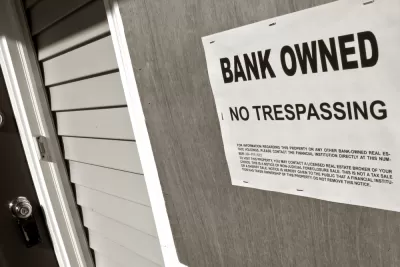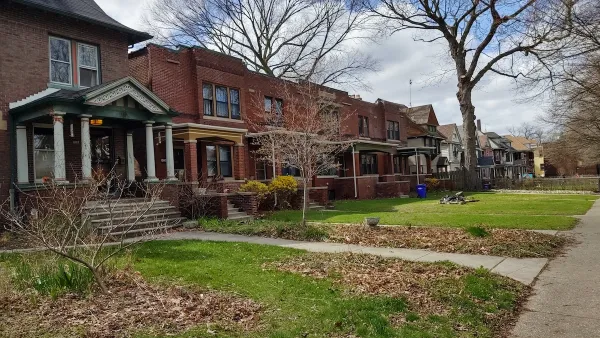The buyback plan diverts properties from Wayne County's tax foreclosure auction, keeping them in government hands until residents can repay the purchase price.

Allie Gross reports on a new program, Make it Home, that offers Detroit homeowners a way to hold onto their deeds. Foreclosed upon for failing to pay property taxes, many low-income homeowners face the prospect of bidding against speculators in an auction, and likely losing their homes.
"Utilizing the Right of Refusal, a provision within Michigan's larger tax reversion law that allows governmental entities to buy foreclosed properties pre-auction, the City of Detroit, with significant funding from the Quicken Loans Community Fund, scooped up the occupied foreclosed homes — diverting them from the auction," Gross writes.
When deeds are issued, the nonprofit United Community Housing Coalition holds them until occupants repay the purchase price, which can range between $1,000 and $8,000. The money then goes into a revolving fund to buy back more homes.
While the foreclosure auction's original purpose was to "reactivate abandoned spaces and spark new ownership," it became a way for speculators and predatory landlords to snap up property without actually rejuvenating neighborhoods. Often, the homes involved stand vacant. Gross calls Make it Home "a remarkable phenomenon: bureaucrats from the public and private spheres coming together to imagine a solution to a problem that's burdened the community for decades."
The program's initial batch of properties totaled 500, but the problem is a lot bigger. "A Wayne County Treasury spokesman said 44,000 properties are at risk of foreclosure next year — 36,000 of them in Detroit."
FULL STORY: Radical new program saves Detroiters from brink of homelessness

Maui's Vacation Rental Debate Turns Ugly
Verbal attacks, misinformation campaigns and fistfights plague a high-stakes debate to convert thousands of vacation rentals into long-term housing.

Planetizen Federal Action Tracker
A weekly monitor of how Trump’s orders and actions are impacting planners and planning in America.

In Urban Planning, AI Prompting Could be the New Design Thinking
Creativity has long been key to great urban design. What if we see AI as our new creative partner?

King County Supportive Housing Program Offers Hope for Unhoused Residents
The county is taking a ‘Housing First’ approach that prioritizes getting people into housing, then offering wraparound supportive services.

Researchers Use AI to Get Clearer Picture of US Housing
Analysts are using artificial intelligence to supercharge their research by allowing them to comb through data faster. Though these AI tools can be error prone, they save time and housing researchers are optimistic about the future.

Making Shared Micromobility More Inclusive
Cities and shared mobility system operators can do more to include people with disabilities in planning and operations, per a new report.
Urban Design for Planners 1: Software Tools
This six-course series explores essential urban design concepts using open source software and equips planners with the tools they need to participate fully in the urban design process.
Planning for Universal Design
Learn the tools for implementing Universal Design in planning regulations.
planning NEXT
Appalachian Highlands Housing Partners
Mpact (founded as Rail~Volution)
City of Camden Redevelopment Agency
City of Astoria
City of Portland
City of Laramie




























